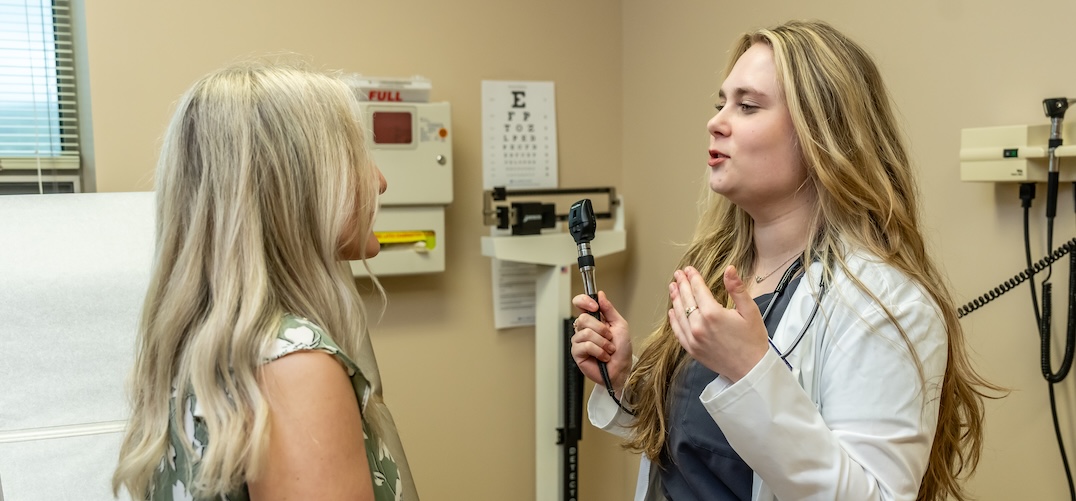What Can You Do with a Master's in Nursing as a Family Nurse Practitioner?

If you’re a registered nurse looking to broaden your professional horizons, earning a Master of Science in Nursing with a Family Nurse Practitioner (FNP) specialization can pave the way for career advancement. The degree prepares you for advanced clinical roles and expanded responsibilities, enabling you to make a lasting difference in patient care.
The role of nurse practitioner is the third fastest-growing career in the U.S., according to the Bureau of Labor Statistics. It’s also been named the number one job in the country by U.S. News & World Report, due to its combination of high salary, upward mobility and robust job growth.
Family nurse practitioner (FNP) is the most versatile of all NP specializations. In this article, we’ll explore FNP career paths, earning potential, workplace settings and the projected increase in the number of MSN-FNP jobs.
What Is a Family Nurse Practitioner?
A family nurse practitioner is an advanced practice registered nurse (APRN) trained to provide comprehensive care for patients of all ages, from infants to older adults. This can be rewarding for nurses who enjoy getting to know their patients and families and developing close relationships with them.
FNPs are prepared to diagnose and manage acute and chronic health conditions, prescribe medications and order and interpret diagnostic tests like lab work and X-rays. They focus on preventative care delivery models, educating patients on disease prevention and healthy lifestyle habits.
FNPs must hold a license and Master of Science in Nursing (MSN) -- at minimum -- and pass a national board certification exam. The breadth of their training allows them to work in a variety of healthcare settings.
Where Can FNPs Work After Earning a Master's Degree?
MSN-FNP jobs are growing in both numbers and importance, and graduates have a wide range of options for work. Here are some of the most common FNP career paths:
- Primary care provider – working in settings like a private family practice or internal medicine practice.
- Urgent care nurse practitioner – treating non-life-threatening injuries and illnesses that require immediate attention.
- Community health clinic nurse – providing comprehensive primary care to underserved populations.
- Retail health clinic nurse – treating patients at walk-in clinics in retail stores and pharmacies.
- Telehealth nurse -- FNPs are increasingly employed in telehealth services for family medicine, offering remote consultations and follow-up virtually.
- Independent practice for NPs – In states that allow full practice authority (working without physician oversight), FNPs can open their own private practice. In collaborative states, they can still have their own practice as long as they have a collaborating physician.
Elevate Your Expertise
Unlock new opportunities and expand your skills with an education designed for your future. Get started today!
Request InformationCan FNPs Work in Both Primary Care and Specialty Care Settings?
Yes. While most FNPs focus on general, family-oriented care, they can work in specialty care because of the scope of their education. Specialties that employ nurse practitioners include:- Cardiology
- Pediatrics
- Women’s health
- Psychiatric mental health
- Urology
- Dermatology
- Oncology
- Hospice and palliative care
What Is the Earning Potential for Family Nurse Practitioners?
Family nurse practitioners command competitive salaries. The median wage for FNPs is estimated at $127,976 for 2025, according to ZipRecruiter. The average income for all nurse practitioners in 2024 was $129,210, according to the Bureau of Labor Statistics.Are FNPs Needed in Rural or Underserved Communities?
Absolutely. FNPs are critically needed in rural communities because of the healthcare shortages in such regions. More than 75 million Americans live in Health Professional Shortage Areas, according to the U.S. Health Resources and Services Administration. Family nurse practitioners have been helping to fill the gap -- one in four rural healthcare access providers are nurse practitioners.Can FNPs Transition into Leadership or Education Roles?
Experienced family nurse practitioners can advance into leadership roles and executive positions within healthcare organizations. They might take positions like clinical director or nurse manager, with responsibilities like managing staff, supervising clinical operations, improving outcomes and maintaining high standards of patient care. FNPs in leadership positions can get involved in making policy and advocating for better access to healthcare.
FNPs can also transition into education, serving as adjunct nursing faculty at colleges and universities, often teaching clinical practicum courses.
Advance Your Nursing Career
Earning a master’s in nursing with a family nurse practitioner specialization can open doors to a dynamic and impactful career. The University of Scranton’s MSN-FNP program is a flexible, online program with full-time and part-time options. Over the course of the program, students participate in synchronous online class meetings and two on-campus intensives and acquire 750 direct patient care hours in clinical experiences.
If you're ready to achieve more in your career, explore our Family Nurse Practitioner MSN today.
Take the Next Step
Your goals are within reach. Now is the time to make your next move and turn ambition into achievement.
Request More Information
Whether you're curious about The University of Scranton application process, admission requirements, tuition and financial aid, or specific program details, we're here to help.
Fill out this form, and we'll be in touch shortly.
By submitting this form, I am providing my express consent authorizing The University of Scranton and their representatives to contact me by email, phone, or text (including use of automatic dialing system) at the home or cell phone number above. Consent is needed to contact you but is not a requirement to register or enroll. Standard text messaging and/or data rates may apply.


